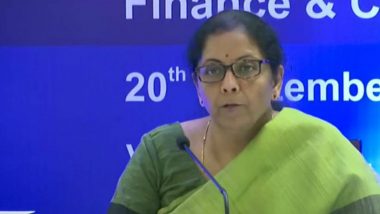New Delhi, September 22: India has become a highly competitive investment destination post corporate tax reduction as the rates are now lower than that in China and most Southeast Asian countries, Finance Minister Nirmala Sitharaman said on Sunday. India was earlier at disadvantage because of a couple of factors and on top of it was the high corporate tax rate, she said, adding that the reduction has made it attractive for foreign investors, including iPhone maker Apple, to set up units in the country. Banking, FMCG to Benefit From Corporate Tax Cut; Pharma, IT to Remain Untouched: Report.
"The top consideration on which India was rejected as investment destination is now better than everybody else... For some one who is coming up with new investment, no country is offering 15 per cent (tax rate). We are giving 15 per cent with no MAT (minimum alternate tax) and simpler taxation structure," she said. Quoting experts, she said India is now much better than China in terms of rate, transparency, and tax administration so companies can now look at India for setting up new units.
"Apple and its entire ecosystem's moving will have a greater impact. Everyone who comes now will straightaway get 15 per cent tax benefit. Component manufacturers of Apple in China will find India more attractive to have units at 15 per cent in India than 25 per cent there," she said. Corporate Tax Rate Cuts Will Help India Become $5 Trillion Economy, Says UP CM Yogi Adityanath.
Apple or any foreign company can come and set up business and enjoy the competitive rate of 15 per cent, she said, adding that the stipulated timeline for the product roll-out from the new unit is on or before March 31, 2023. In the biggest reduction in 28 years, the government on Friday slashed corporate tax by almost 10 percentage points as it looked to pull the economy out of a six-year low growth and a 45-year high unemployment rate by reviving private investments with a Rs 1.45-lakh crore tax break.
Base corporate tax for existing companies has been reduced to 22 per cent from the current 30 per cent; and for new manufacturing firms, incorporated after October 1, 2019 and starting operations before March 31, 2023, to 15 per cent from the current 25 per cent. India had the highest effective corporate tax rate of 38.05 per cent in 1997.
Companies in China, South Korean and Indonesia pay 25 per cent tax, while those in Malaysia pay 24 per cent. Only Japan has a higher tax than India at 30.6 per cent. Hong Kong has the lowest corporate tax rate of 16.5 per cent, while Singapore has 17 per cent rate and Thailand and Vietnam levy 20 per cent tax on companies. Corporate Tax in India Now Second Lowest in Asia After Nirmala Sitharaman Announces Rate Cut; Here's Where it Stands in The World.
The finance minister also made it clear that the upward revision of corporate tax rate from this level would be difficult. "Anybody who wants to change will have to go to Parliament, she said, adding that it will be difficult to increase tax rate from this level as justification for raising would be difficult," she added. With regard to reduction in personal income tax, she said there is nothing at the moment and the government has not thought about it.
On concerns of any expenditure cut to meet fiscal deficit due to tax break, she said the government is not intending any such move as of now. In fact, the expenditure secretary is having weekly meeting with various departments to push spending by them as per the Budget plan. He is asking every ministry to spend the money given in the Budget and even asked the agriculture ministry to push PM-KISAN scheme for which target is 14.5 crore farmers, she added.
With regard to disinvestment, she said the government is on track to meet the target.
The government will focus on 23 companies which has been approved by the Cabinet Committee on Economic Affairs (CCEA), she said, adding that the Air India call will be taken by the Group of Minister which will meet in the next few days. To give a push to further improve liquidity, the finance minister said, she has called meeting of private sector banks as well. What is Corporate Tax? Here's All About the Capital Tax and How it is Charged by Union Govt.
On the fiscal deficit target, she said any decision on tweaking the target would be taken near Budget. "The decision will be taken near the next Budget," she said. The government has fixed fiscal deficit target of 3.3 per cent of the gross domestic product for the current financial year.













 Quickly
Quickly




















